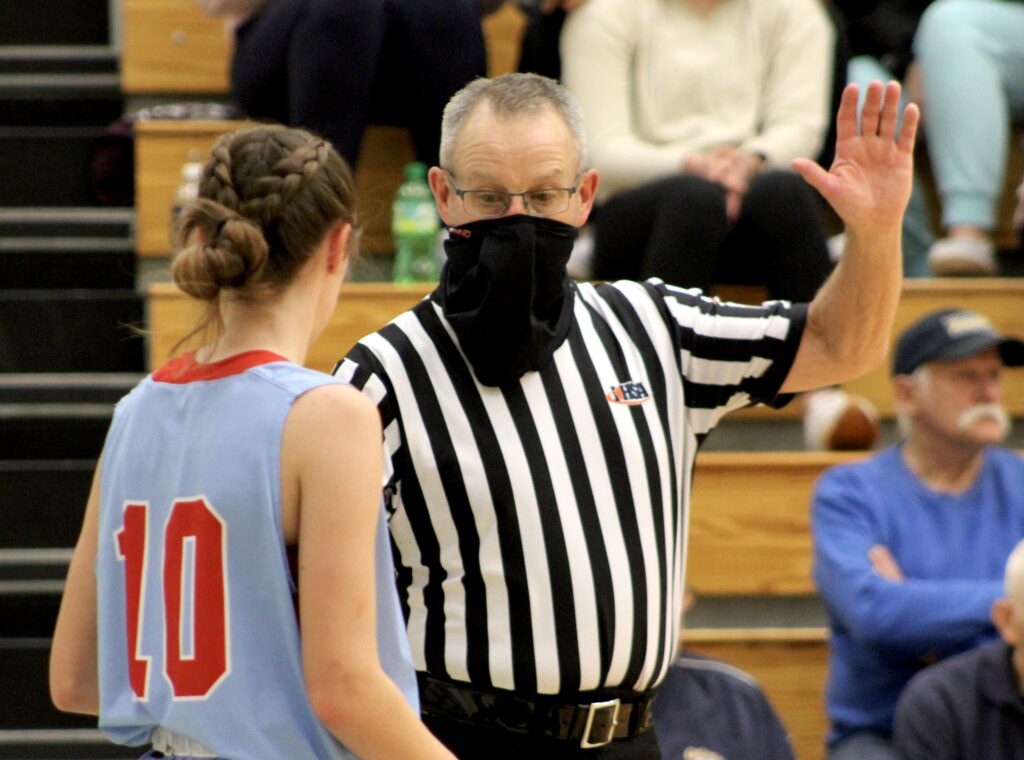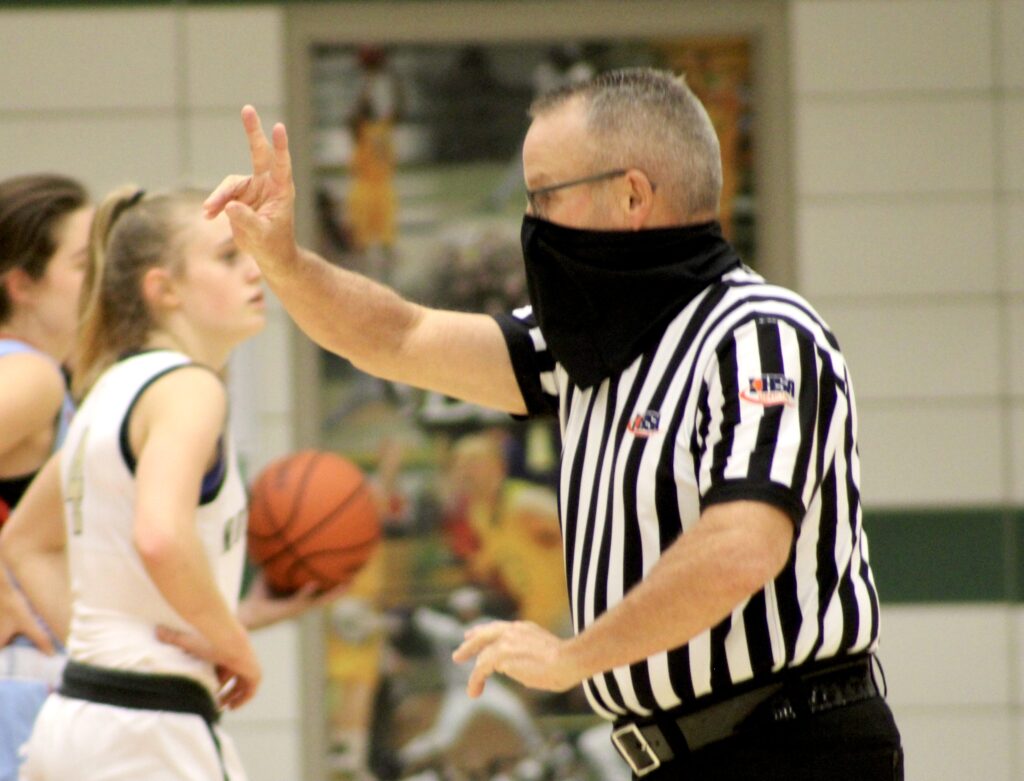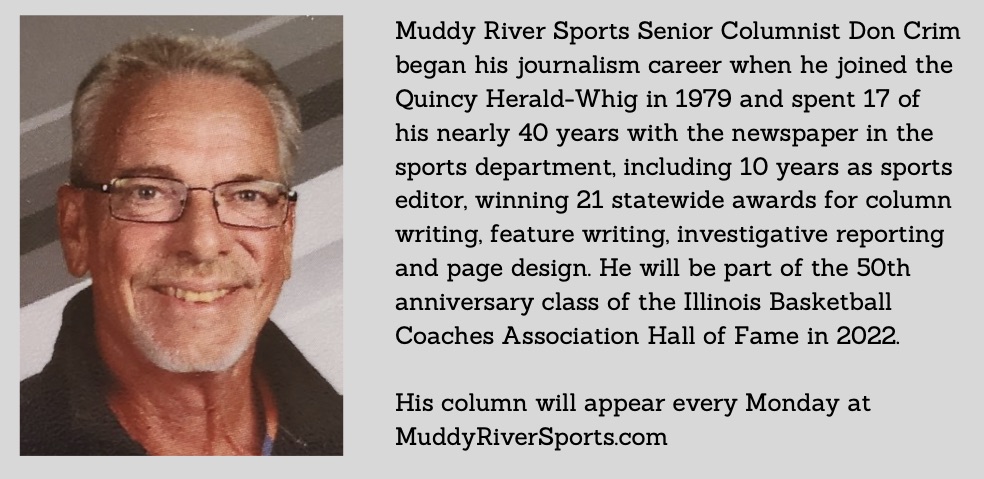Crim: Elledge remains man for all seasons and integral part of athletics

Doug Elledge has the routine down pat.
He throws his high school football officiating gear into the car in late August. He pulls it out in November and replaces it with a whistle and striped shirt to referee basketball. Then, in March, he ditches those for a chest protector, face mask and shin guards to umpire baseball.
In the summer, he golfs.
“Been doing that on and off since college,” Elledge said of his officiating trifecta. “Started out with Don Bigley to make a little pocket change. I enjoy getting to the game and seeing the kids play, being around that atmosphere.
“Crazy as it sounds, I like doing it.”
Obviously. He worked four basketball games in one day just before Christmas and his crew — he works alongside John Shepard and Dwain Kurfman — have only three scheduled nights off this month.
And those nights off may be spent in a gymnasium somewhere in West-Central Illinois if a school finds itself short an official or two.
A rugged workload for anybody, let alone a guy who just turned 66.
“There’s nothing on TV and it keeps you in good shape, so why not?” Elledge said. “Right now, I’m in as good of shape as I was 15 years ago.”
Elledge has been around sports since growing up in Perry, Ill. He graduated high school in 1974 and played baseball at Quincy College. He also played for the Pike County Merchants for several summers in the men’s fast-pitch softball league at Maranatha Park in Quincy.
“Just a bunch of guys who grew up together and enjoyed hanging out and having some fun,” he said of the Merchants.
Elledge got into coaching and was an assistant to Liberty High School basketball coach Paul Kreke, a former QC baseball teammate, when the Eagles made a magical run to the Illinois Class A state tournament in March 1981.
Cinderella Liberty finished fourth. A week later, undefeated Quincy High School captured its first state championship since 1934 in convincing fashion in Class AA.
“Those were good basketball times in Adams County,” Elledge said with a laugh.
Two seasons later, Elledge took his first basketball head coaching job at Plymouth, a small Hancock County high school that would within a few years consolidate with Southeastern in nearby Augusta. His teams finished with winning records both seasons there.
“Really good experience; can’t top it,” he said. “The team the second year played better than their abilities. We only had 12 kids total playing JV and varsity, so the seven kids who played JV were the bench during varsity games.
“They had good basketball knowledge, were coachable and were fun to be around. Of course, it helped having Todd Rash scoring 26-27 points per game.”

Elledge left Plymouth in 1984 for Carthage High School, now Illini West. “We just moved on,” he said, something he did repeatedly during his coaching career.
Three years in Carthage were followed by a six-year stint at Liberty, which won 20 or more games four times and 19 games another. He spent two seasons at Southeastern, a year as an assistant to Brad Hufty in Louisiana, Mo., then a year as head coach at West Pike and two more at Griggsville-Perry.
Elledge joined Jon Hampton’s staff at Pittsfield in 1999 and was elevated to head coach in 2001 when Hampton left for Riverton. The Saukees went 57-29 over the next three seasons and reached the sectional title game in 2004 before Elledge quit to pursue an administrative degree.
His teams won 297 games during his 19 seasons as a head coach.
“Just time to move on,” Elledge said, repeating a career refrain. “Had to start thinking about retirement. It’s hard to retire on a coach’s salary.”
He eventually retired from education after seven years as an administrator at Petersburg Porta High School but never relinquished his passion for sports. He became a full-time basketball referee and has worked three state finals in baseball and two in football and is in line for a couple more.
“If you can contribute to the game, you should contribute to the game,” Elledge said. “There aren’t enough contributions right now.
“I’ve recruited a few kids over the years (to officiate), but they might last only a year or two. It’s hard to recruit younger kids to work in an area where you are criticized often and loudly.
“The way I look at it, whatever they say is probably true, so don’t worry about it. It’s about the kids, what’s happening inside the lines, not them.”
From different vantage points, Elledge has witnessed several changes in high school basketball over the past 40 years, and more could be on the horizon.
The 3-point shot expanded the court, forcing teams to defend out to 22 feet from the basket. More players shoot from the perimeter. Players are more likely to drive, penetrate and look to pass outside rather than relentlessly pounding the ball inside to score.
“It’s a more dribble-oriented game,’’ Elledge said. “Twenty-five years ago, we thought it was appropriate to pass the ball four times before you dribbled it, to move the defense as much as you could. Now they dribble to try to pinch two guys together.
“It’s not better, it’s not worse, it’s just different. We’ll have a shot clock in the next five years and that will drastically change the game.”
If and when that occurs, there’s a chance Doug Elledge will still be spending his winter nights in gymnasiums around the area contributing to the game.
“We’ll see how it goes,” he said. “My legs are tired today, but I feel good.
“Like I said, there’s nothing on TV.”

Miss Clipping Out Stories to Save for Later?
Click the Purchase Story button below to order a print of this story. We will print it for you on matte photo paper to keep forever.
